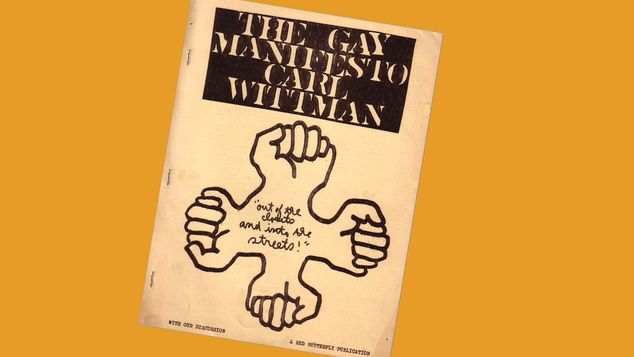Carl Wittman wrote the influential essay ‘A Gay Manifesto’
Carl Wittman was an American gay rights activist and author of the influential essay A Gay Manifesto which was first published in 1970. He died on this day in 1986.
Wittman was a member of the Gay Liberation Front and the Gay Activists Alliance and was involved in several LGBTQ+ rights organisations and movements in the 1970s.
Wittman’s manifesto, written in early 1969, called for the creation of a “gay community” and advocated for the use of direct action and political organizing to achieve LGBTQ+ rights. Wittman’s work has been credited with helping to shape the gay liberation movement of the 1970s.

Born in 1943, he self-identified as being gay when he was a 14-year-old, but he remained in the closet until the late 1960s when he came out in an article that he wrote for the anti-war magazine Liberation. At the time Wittman was living in San Franacisco.
His coming out article sparked a wave of homophobic reactions within the left-wing political groups he was involved in, and this in turn inspired him to write his landmark essay. Wittman wrote the piece before the Stonewall Riots of 1969, but it was not published until the following year.
By the mid 1970s Wittman had relocated to Oregon where he and his partner Allan Troxler set up a commune. They published a zine called RFD (Radical Faerie Digest) which promoted ideals of sexual freedom and celebrating nature.
In the early 1980s, Wittman created the North Carolina Lesbian and Gay Health Project (LGHP) with David Jolly, Timmer McBride, and Aida Wakil to address the health needs of sexual minorities in that state.
He died on this day in 1986. He was living with AIDS and had been denied hospital treatment. Surrounded by his friends, he took his own life.
Billy Mackenzie from The Associates died in 1997
Billy Mackenzie was the co-founder and lead singer of Scottish post-punk and new wave band The Associates.
They found chart success in 1982 with the track Party Fears Two. Throughout their career they released four albums, and Mackenzie also released a solo album Outernational in 1992.
Much of Mackenzie’s lyrical output was about challenges he experienced relating to his sexuality and gender.
He shared that he was bisexual in a 1994 interview, and while he never publicly labelled his gender, in the same interview he also said “I’m just waiting for the day when we’re all what we were intended to be… hermaphrodites.”
Mackenzie collaborated with electro band Yello, Barry Adamson and Apollo 440, as well as contributing vocals to the British Electric Foundation Project.
He died by suicide on this day. Depression and the recent death of his mother were said to be contributing factors.
B.E.F paid tribute to Mackenzie by covering his song Party Fears Two and Apollo 440 dedicated their album to his memory. Siouxie Sioux wrote the song Say which was released by her band The Creatures which mentions Mackenzie, while The Cure’s song Cut Here includes lyrics outlining Robert Smith’s regret at not paying more attention to Mackenzie the last time that they saw each other.
Since his passing five more albums of solo material have been posthumously released.
Do you need some support?
If you are struggling with anxiety or depression, support and counselling are available from:
QLife: 1800 184 527 / qlife.org.au (Webchat 3pm – midnight)
QLife are a counselling and referral service for LGBTQIA+ people.
DISCHARGED: info@discharged.org.au / discharged.org.au
Discharged is a trans-led support service with peer support groups for trans and gender diverse folks.
Lifeline: 13 11 14 / lifeline.org.au
Beyondblue: 1300 22 4636 / www.beyondblue.org.au



